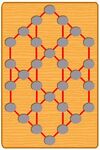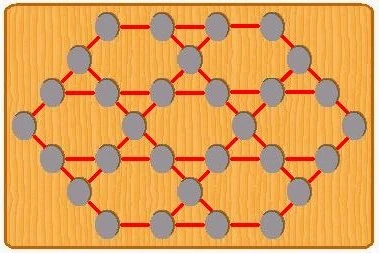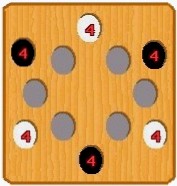| Stoplight Mancala |
| Inventors: Donald Philip Green, 2006 |
| Ranks: (hexagonal board) |
| Sowing: Single laps |
| Region: USA |
Stoplight Mancala is a two-dimensional sowing game invented by Donald Philip Green in 2006. Variants are Doncala for children (2006) and a commercialized form known as Fishpond Mancala (2007).
Don Green was the Director of the Institution for Social and Policy Studies at Yale (1996-2011) and an A. Whitney Griswold Professor of the Department of Political Science at Yale University (2001-2011). He moved in 2011 to Columbia University. Green also designed Octi, a challenging abstract strategy game, and Royal Carpet, a game of tempo. Stoplight Mancala and Doncala are implemented on Zillions of Games.
Rules
The game is played by two persons on a board with 30 bowls. There are 12 red, orange and green stones and 3 black and white stones. The black and white stones are owned by a player, while the other stones are neutral.
Initial Position
On his turn a player distributes the contents of a bowl, which contains a stone of his colour by sowing them, one by one, into ensuing bowls. He is permitted to sow in any direction and he may double-back into the original bowl.
Path of Distribution
After his sowing, the player captures a stone if it forms an unbroken 3-in-a-row, i.e. if 3 bowls are in a line, each carrying a stone of the same colour. This is continued until 3-in-a-rows remain.
The player who first captures 16 stones wins.
Variants
"No-return" Stoplight Mancala
In this variation, it is not permitted to sow a stone to the bowl where it came from.
Doncala
This is a simplified version of Stoplight Mancala designed for children. The goal is to capture 7 stones.
Initial Position
Fishpond Mancala

Path of Distribution
Fishpond Mancala is a commercialized variant published by MindLab in 2007. MindLab promulgates the "Mind Lab Method", an approach to the development and training of thinking abilities and life skills through thinking games. It significantly improves math and verbal scores.
Differences:
- Board Orientation: Corners of the outer hexagon are pointing upward and downward, that is, the board has been rotated 90 degrees.
- Goal: The first player to capture 15 stones wins.
Initial Position
Fishpond Mancala (Variant)
Don Green recommends that young children "may wish to play for 10 stones".
External Links
- Donald Green's homepage
- Curriculum Vitae
- Stoplight Mancala at Zillions of Games
- Doncala at Zillions of Games
- The Octi homepage
- Royal Carpet
- MindLab International
Copyright
© Ralf Gering
Under the CC by-sa 2.5 license.



